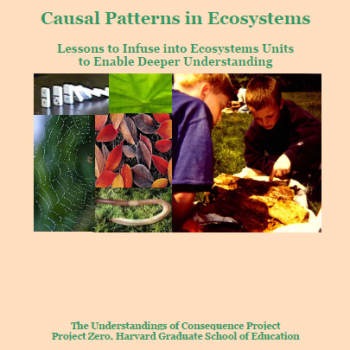
Causal Patterns in Ecosystems: Lessons to Infuse into Ecosystems Units...
PUBLISHED:Resource Summary
Causal Patterns in Ecosystems is a curriculum module for use by teachers who want their students to develop deep understanding of ecosystems concepts. Research shows that students who are taught about the nature of the causal patterns while learning science achieve deeper understanding than students who learn the science concepts only. Each section addresses one of a set of six broad and persistent misunderstandings about ecosystems that most students hold, stemming from their reasoning about the nature of causality. The module introduces RECAST (REveal CAusal STructure) activities, games, and simulations that are designed to reveal the underlying causal structure of concepts and to help students restructure their understandings. Each section contains one main activity, a set of additional reinforcement activities, and supporting materials for teaching them. Background information helps teachers recognize the misunderstanding and how it typically shows up in students reasoning about ecosystems. Understanding goals for the subject matter and the causal patterns are listed. The curriculum incorporates best practices in science education, such as inquiry-based learning and modeling. The module is aimed at upper elementary but can be modified for use with other ages. The module can be infused into broader units on ecosystems. It was developed as part of a research project called the Understandings of Consequence Project, which is supported by the National Science Foundation. 2011


-
-
-
-
-
-
Support PZ's Reach